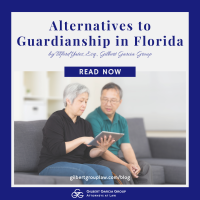Alternatives to Guardianship

By Tilford Yates, Esq.
Gilbert Garcia Group, P.A.
In Florida, Guardianship is the legal proceeding of being appointed Guardian to exercise legal rights on behalf of someone that lacks the capacity to do so themselves. It’s an extremely important proceeding that is often necessary for family members and friends to take care of a loved one. However, is becoming appointed guardian of someone the only way that you can take care of a loved one? I don’t think so!
Guardianship is the most intrusive form of intervening to help someone. The Florida courts always prefer the least restrictive means possible. If something else can be done instead of guardianship, Florida law prefers that. What are some examples of these other less-restrictive means? One document that is beneficial is called a durable power of attorney (DPOA). The other beneficial document is called a Health Care Power of Attorney or Designation of Health Care Surrogate. If these two documents are validly executed, guardianship may not be necessary, and the individual that would be subject to having a guardian would retain their rights.
Durable Power of Attorney
Powers of attorney are governed by Chapter 709 of the Florida Statutes. The power of attorney allows for someone (known as the principal) to appoint another individual (known as attorney in fact) to act on their behalf regarding their finances and property. The named attorney in fact in the power of attorney is also known as an agent. The most common powers granted to an attorney in fact is that they have the ability to: conduct banking transactions, sue, purchase and sell personal property, and purchase and sell real property on behalf of the principal. While these are some of the most common powers, there are far more powers that can be listed. A named attorney in fact can only act on whatever powers that are specifically granted in the power of attorney. There are certain powers that are called super powers, and these powers have to be initialed by the principal to be valid. These super powers are:
- Make an inter vivos trust or amend an existing trust
- Make a gift
- Create or change rights of survivorship
- Create or change beneficiary designation, or waive principal’s right to be a beneficiary
- Disclaim property and powers of appointment
What makes the power of attorney valid?
A power of attorney is valid when there is a named attorney in fact that is 18 years of age or older, the document is signed by the principal and by two subscribing witnesses, and the document is acknowledged by the principal before a notary public. Additionally, the principal executing the power of attorney must have capacity to understand the effects of the power of attorney. One of the greatest benefits to the power of attorney is that if the principal ever becomes incapacitated, the named attorney in fact can still act on behalf of the principal without having to file for guardianship. This can only happen if the power of attorney is a durable. A power of attorney is durable if it contains the words: “This durable power of attorney is not terminated by subsequent incapacity of the principal except as provided in Chapter 709, Florida Statutes,” or similar words that show the principal’s intent.
Health Care Power of Attorney
The health care power of attorney or designation of health care surrogate is similar to the power of attorney. Designation of a health care surrogate is governed by Chapter 765 of the Florida Statutes. This document allows a principal to designate an individual (known as surrogate) to make health care decisions for the principal and to receive healthcare information on behalf of the principal if they are unable to do so themselves.
When is a designation of health care surrogate valid?
Just as for a power of attorney, a designation of health care surrogate is valid when there is a named surrogate that is 18 years of age or older, the document is signed by the principal and by two subscribing witnesses, and the document is acknowledged by the principal before a notary public. Additionally, the principal must have the capacity to understand the effects of the designation of health care surrogate.
Schedule a Complimentary Consultation!
One way to avoid having a guardianship proceeding filed for you is if you have a valid durable power of attorney and health care power of attorney executed prior to you becoming incapacitated. Please give us a call for a free consultation to discuss these important estate planning documents in depth! One of Gilbert Garcia Group’s experienced guardianship and estate planning attorneys will walk you through the process and advise what is best for you!
